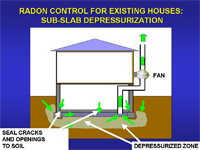
Poster Contest Continues for 2013-14!
We are pleased to announce that the National Radon Poster Contest will be conducted again this year.
Click here to see the current Poster Contest Brochure.
HUD Secretary Announces New Multi-family Radon Policy!
Press release, executive summary and other policy documents can be found here:
http://portal.hud.gov/hudportal/HUD?src=/program_offices/healthy_homes/advhh
Reducing Radon In Your Home
Reliable techniques exist for reducing radon levels in homes. Experience with radon mitigation systems has developed to the point that virtually any home can be fixed, either by a trained radon contractor, or in some cases, by homeowners who accomplish the repairs themselves. One out of 15 (6%) homes nationally may have elevated indoor radon levels that should be lower. The percentage of elevated homes in your state may be much higher. The only way to know a house is elevated is to test.
Radon in Spanish Brochure with Test Kit Order Coupon
NBC Today Show Coverage of Radon in Schools
- Article
-
Video:
Have You Tested Your Home?
The Environmental Protection Agency (EPA) encourages all homeowners to test their residences for radon gas concentrations. The National Radon Program Services at Kansas State University (K-state) has radon test kits available for purchase by homeowners for personal use.
National Radon Program Services
Kansas State University (K-State), as a partner in the Midwest Universities Radon Consortium, provides national radon services and projects for the US EPA. Our responsibilities include the National Radon Poster Contest, National Radon Hotlines, referrals to State Radon Programs, Radon Test Kit Orders and Coupons, Radon Mitigation Promotion, and other technical assistance and outreach activities.
Contacts for Program Information
Science Fair Project
The National Radon Science Fair Project provides ideas for science fair projects that will explain the science, health risks, exposure routes, mitigation and other aspects of radon. Geared towards teachers and middle and high school students, it provides helpful images, diagrams, and resources about radon and what can be done to prevent exposure to radon.
U.S. Surgeon General Issues New National Health Advisory on Radon
Today the Surgeon General of the United States, Richard Carmona, issued a Health Advisory about the health risk from exposure to radon in indoor air. He urged Americans to test their homes to find out how much radon they might be breathing. Dr. Carmona also stressed the need to remedy the problem as soon as possible when the radon level is 4 pCi/L or more. Dr. Carmona noted that more than 20,000 Americans die of radon-related lung cancer each year. View the press release and full text of the Surgeon General's Health Advisory on radon.



